Why was shopkeeper Asad Shah murdered?
- Published

Asad Shah was a well-known figure in the Shawlands area of Glasgow
Before he was brutally murdered on 24 March of this year, Glasgow shopkeeper Asad Shah had uploaded hundreds of videos to YouTube.
Nearly all were filmed over the counter of his newsagent shop in the Shawlands area of the city.
In one he's cutting a birthday cake for a young child celebrating his sixth birthday in the store alongside his mother.
It's a touching window into the life of a man who had become a much loved figure in his local community.
After he was killed hundreds turned out for a vigil in his honour.
'People person'
His brother - speaking on the condition of anonymity - told me Asad was "a people person. He always put everyone else ahead of himself. He was very jelled with the community."
He added that Asad had known the six-year-old boy in the video since he lost his dad when he was a baby.
"That family was quite down, and my brother was always there for the mother and the little baby and they always kind of picked up their morale," he said.
The family had moved out of Glasgow but still returned every year to see Asad and to celebrate the child's birthday in his shop.
Who would want to kill a man like that?
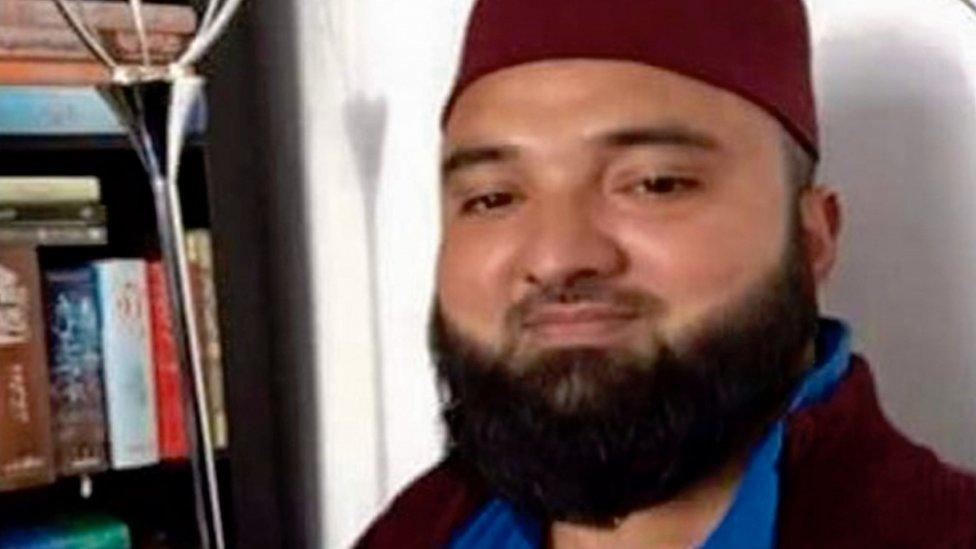
Tanveer Ahmed travelled from his home in Bradford to murder Mr Shah
When it initially emerged that Asad Shah's attacker was another Muslim, newspaper reports speculated that he had been killed by an extremist for posting the message "a very happy Easter to my beloved Christian nation" on Facebook just hours before his death.
The real story is perhaps just as shocking.
It links this murder on British streets to the murder of a Pakistani politician five years ago. Both were accused by some Muslims of having committed blasphemy.
The killer of Asad Shah idolised and was in close contact with extremists in Pakistan, and was seemingly inspired by their example to kill Asad Shah - even calling them after the murder to tell them about what he had done.
Considered heretical
Asad's family had experience of religious extremism before.
They moved to Scotland from Pakistan just under 20 years ago after being persecuted for their Ahmadiyya faith.
Ahmadiyya are considered heretical by many Muslims for believing another prophet succeeded Muhammad.
The majority of Muslims believe Muhammad was the last and final prophet - and anything other than that is blasphemy.
In Pakistan, Asad Shah's father ran a pharmacy and a hospital for women but Asad's brother says they were targeted by zealots: "His pharmacy was set on fire by the extremists there, and his hospital was burnt down.
"We had an apartment above the pharmacy where my parents were with the kids and that fire - the kind neighbours basically helped us escape from the rooftop."

Mr Shah was found seriously injured outside his shop in Shawlands

With the Pakistani police unable to protect them, the family decided to move to Britain. They never thought violent religious intolerance would touch them here.
Asad's brother explained: "It was my dad trying to protect all the kids thinking something like this would happen in Pakistan… and it's happened here. We didn't suspect something like that would happen in the UK."
But it seems it wasn't Asad Shah's Ahmadiyya faith that attracted the fatal attention of extremists in Britain - it was his YouTube videos.
Violent threats
Most of them were about his spiritual beliefs. He calls for peace, love and unity across the world.
At times, he claims to be a prophet himself.
The majority of videos only attracted a handful of views, but some attracted more - along with angry, at times violent, threats by some Muslims accusing him of blasphemy.

Asad Shah had uploaded hundreds of videos of himself to YouTube

The videos included one of Mr Shah helping a six-year-old boy to celebrate his birthday
Among those who heard about his videos was the man who would go on to kill him - 32 year old Tanveer Ahmed, a cab driver from Bradford who had also moved to Britain from Pakistan.
In Bradford, Ahmed was a member of a religious group called Dawat e Islami, although they say clearly they do not condone his actions.
Clad in distinctive green turbans, Dawat e Islami describe themselves as a peaceful and non political organisation.
They were founded in Pakistan but are active across countries in the Muslim world - dedicated to spreading their version of Islam.
Too liberal
They're from a Pakistani sect known as Barelwis - normally associated with a peaceful, spiritual interpretation of Islam.
Barelwis have been attacked by jihadi groups like the Taliban who see them as too liberal.
But some hardline Barelwi groups and preachers have acted violently themselves - particularly when it comes to perceived insults to the Prophet Muhammad.
They pride themselves on being "aashiq-e-rasool" or lovers of the Prophet - who are obliged to defend his honour.
They include Mumtaz Qadri, a Pakistani police bodyguard who was also associated with Dawat e Islami in Pakistan, and who would become an inspirational figure for Tanveer Ahmed.
In 2011, Qadri shot and killed a prominent, liberal Pakistani politician Salman Taseer - who had proposed reforming Pakistan's blasphemy laws.
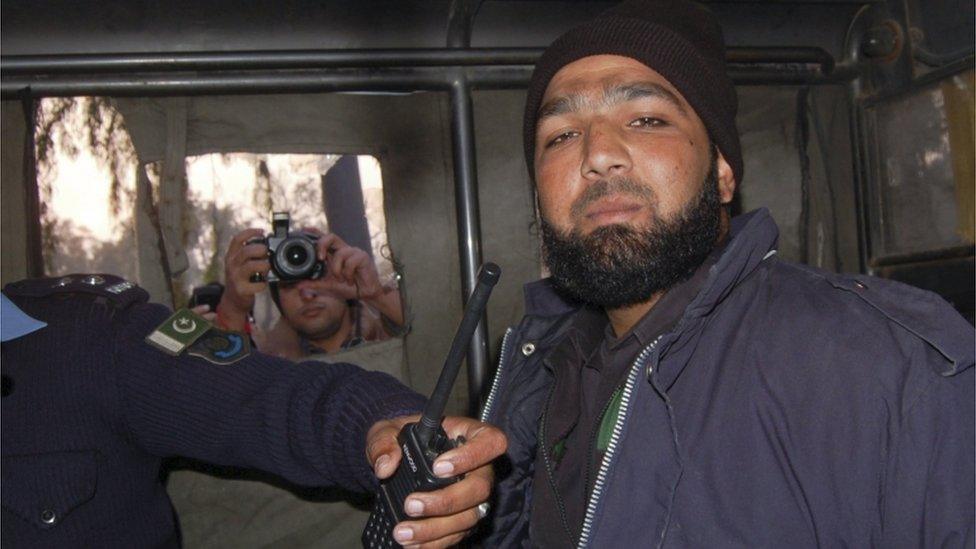
Mumtaz Qadri was executed earlier this year after assassinating liberal Pakistani politician Salman Taseer
These laws are seen by many human rights activists as being a tool to target minority communities - or to settle personal feuds - with people wrongly accused of committing blasphemy.
Taseer's calls for reform calls lead to angry protests in Pakistan, led by Barelwi groups who accused Taseer of wanting to allow people to insult the Prophet Muhammad.
In January 2011, Mumtaz Qadri - who had been acting as one of Taseer's bodyguards - opened fire and killed him in an Islamabad market.
Qadri said he had acted alone and his actions were nothing to do with Dawat e Islami or any other religious or political group.
He was arrested and earlier this year was executed. But many in Pakistan saw him as a hero who wanted to defend the honour of the Prophet Muhammad. His funeral was attended by thousands of mourners.
Justifiable cause
Some British Muslim mosques and imams were amongst those who praised Qadri as a martyr and an Islamic warrior while at the same time condemning groups such as IS and Al Qaeda.
They felt this case was different as it involved defending the Prophet Muhammad - in their view a justifiable cause.
Among Qadri's British admirers was Tanveer Ahmed, the man who would go on to kill Asad Shah.
Qadri's brother, Dilpazeer - who also supports the killing of Salman Taseer - told me Tanveer Ahmed used to regularly write letters of support to Mumtaz Qadri before his execution.
He also told me that he used to speak to Tanveer Ahmed himself, and that on one occasion Tanveer Ahmed told him he had had a dream about Mumtaz Qadri - in which Qadri "said that I had been chosen for some work and congratulated him for being chosen…"
In Islam dreams are often imbued with deep, spiritual significance and are seen as signs predicting the future.
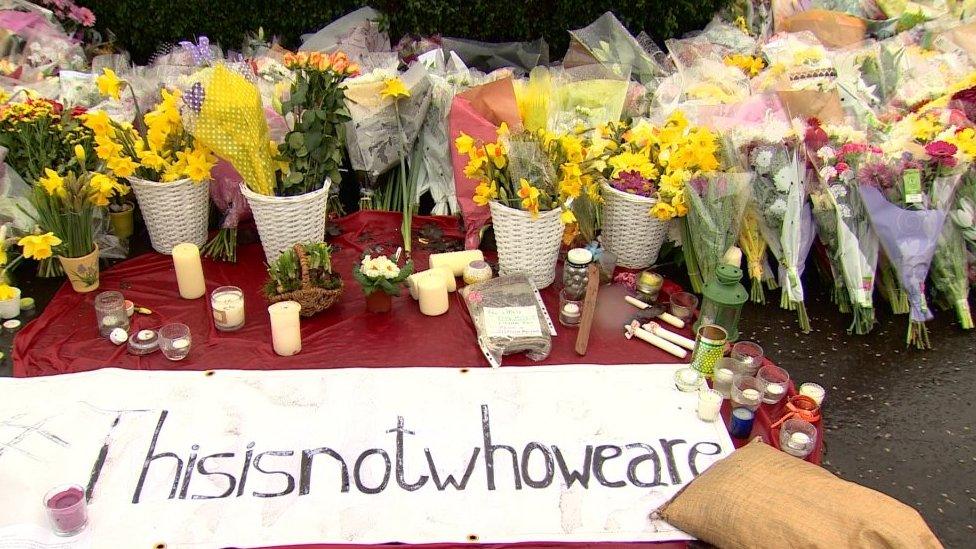
The murder of Mr Shah horrified the local community, with hundreds of floral tributes being left in his memory
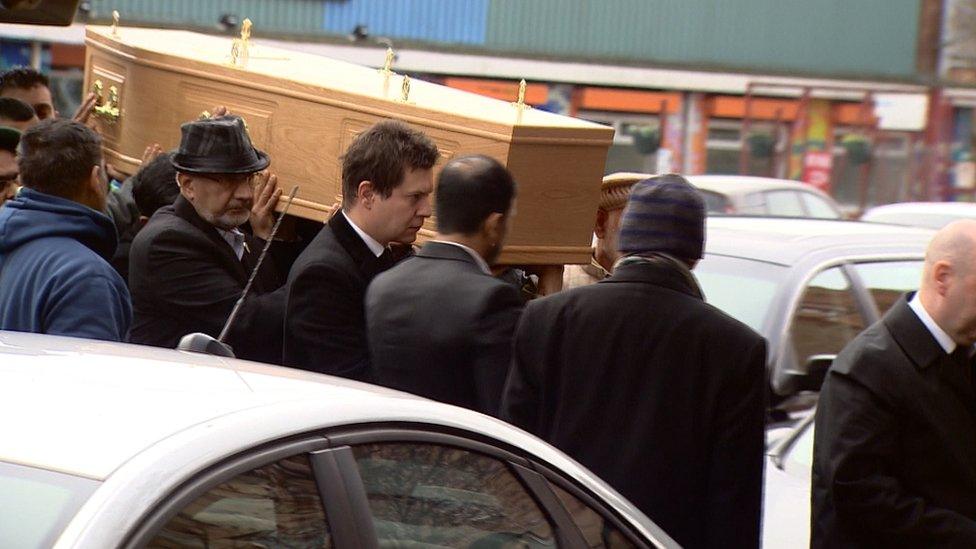
Mr Shah's funeral took place at the Ahmadiyya Muslim mosque in the Yorkhill area of Glasgow
According to a purported leaked message from an associate of Mumtaz Qadri's brother this dream was what inspired Tanveer Ahmed to kill Asad Shah, emulating what Mumtaz Qadri had done to an alleged blasphemer.
The same leaked message also claims that Tanveer Ahmed consulted Mumtaz Qadri's brother about his plans for the murder.
Mumtaz Qadri's brother denied having any prior knowledge of the murder, or that the dream was the inspiration for the murder.
Phone call
But he did admit to having received a phone call from Tanveer Ahmed in prison just days after the killing.
He told me about their conversation: "I said that he had done a great job to protect the name of the Prophet. Because if anyone in the world says anything bad about the Prophet than this is what will happen. Peace can only take place if the Prophet is not insulted."
Supporters of both Mumtaz Qadri and Tanveer Ahmed have produced online photo montages praising both the killers and drawing links between them.
The issue of blasphemy has become increasingly fraught in Pakistan, and some campaigners in Britain worry that hardline views are being imported into the UK.
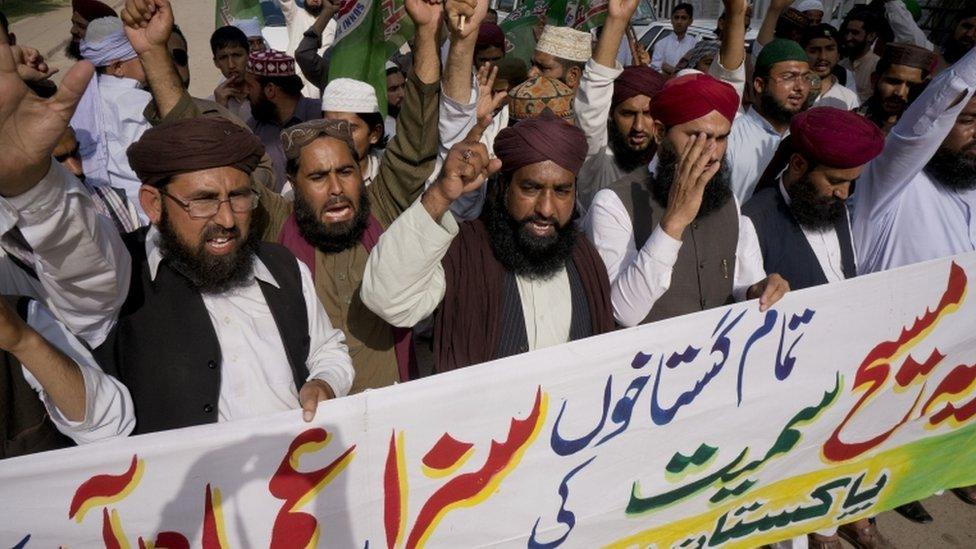
Angry protests have been held in Pakistan in support of the country's blasphemy laws
They include a number of Barelwi scholars and imams who have condemned Mumtaz Qadri and Tanveer Ahmed.
In April, Tanveer Ahmed took the highly unusual step of releasing a statement through his lawyer, before even entering a plea, outlining his motivations for killing Asad Shah.
He said: "This all happened for one reason and no other issues and no other intentions.
"Asad Shah disrespected the messenger of Islam the Prophet Muhammad peace be upon him. Mr Shah claimed to be a Prophet."
Tanveer Ahmed also appears to be free to communicate his beliefs to others even from inside prison.
An audio message purportedly sent by him to supporters who uploaded it to Facebook marks the Muslim festival of Eid earlier this week.
It ends with the chilling slogan in Urdu: "The penalty for those who disrespect the Prophet is cutting the head from the body."
The BBC has not been able to independently verify the message is from Tanveer Ahmed.
'Enemy of humanity'
I asked Asad Shah's brother what he made of Tanveer Ahmed's justification for killing Asad Shah, and whether he has any message for him?
He replied: "I wouldn't call him a man. I really don't have any message for that monster - he basically took away a person who was peaceful who wanted unity in the world, who wanted the communities to unite.
"Him (Tanveer Ahmed) harming someone of peace… he's an enemy of humanity."
He says all his brother was doing was making videos calling for a more compassionate world. And if anyone felt that he was disrespecting the Prophet Muhammad - then violence was clearly not the answer to that.
"I don't think the Prophet Muhammad would've done anything like that. I think it's very clear when you look at history - there was an elderly woman who used to throw rubbish on Muhammad.
"How did he deal with that situation? One day he was going to see the prayers and there was no rubbish thrown on him, and he questioned why is that not happening today?
"Someone mentioned that she's ill so what did he do? He went to her house to ask how she was. That's what Prophet Muhammad did. He didn't resort to violence."
Now some in Asad Shah's family - who years ago sought sanctuary in Britain - are planning on leaving here too in fear of facing yet more persecution.
As his brother says: "The family don't feel safe anymore living here in Scotland and it has split the family apart."